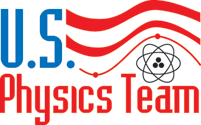
Did you know?
In 1986, under the direction of the AAPT Executive Officer, Jack Wilson, the American Association of Physics Teachers (AAPT) organized the United States Physics Team for the first time. — AAPT.ORG
Program & History
AAPT and the American Institute of Physics (AIP) sponsor a competition each year for high school students to represent the United States at the International Physics Olympiad Competition.
You can help support the U.S. Physics Team by donating.
Mission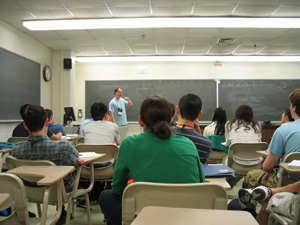
The mission of the U.S. Physics Team Program is to promote and demonstrate academic excellence through preparation for and participation in the International Physics Olympiad.
The U.S. Physics Team will fulfill its mission by achieving the following goals:
- encourage excellence in physics education and to reward outstanding physics students
- expand awareness of and participation in the program
- provide a meaningful scientific and cultural experience for team members, including opportunities to network and meet new people, learn in intellectual and experiential ways, and gain international exposure
- win medals and compete successfully on an international level
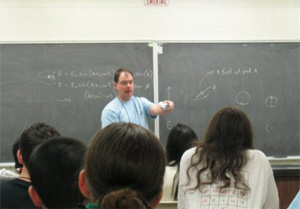
Physics Team Selection
AAPT is responsible for recruiting, selecting and training teams each year to compete in the International Physics Olympiad Competition. This selection process begins in late January when high schools register their students to participate in the F=ma exam. Approximately 400 top scorers on this first test advance to the USA Physics Team Exam.
The USA Physics Team Exam is used as the basis for selection of the 20 members of the U.S. Physics Team. These students, from schools all over the United States, travel to the University of Maryland-College Park at the end of May for the annual U.S. Physics Team Training Camp. There they engage in ten days of intense studying, testing and problem solving.
At the end of that training camp, five students will be selected for the "Traveling Team." The Traveling Team will return for three additional days of intense laboratory work before they are ready for the International Event.

Recognition
Participants will be given certificates to recognize and celebrate the accomplishments of these bright, highly motivated students. We hope these certificates will be distributed at school-wide award ceremonies.
History
The Olympiad is a nine-day international competition among pre-university students from more than 60 nations. At the International Physics Olympiad, the competitors are asked to solve challenging theoretical and experimental physics problems.
Begun in 1967 among eastern European countries, the International Physics Olympiad Competition gradually grew to include many western countries during the 1970s. In 1986, under the direction of the AAPT Executive Officer, Jack Wilson, the American Association of Physics Teachers (AAPT) organized the United States Physics Team for the first time.
The 1986 team was made up of 20 talented high school physics students who had been nominated by their teachers. Following a rigorous program in the physics department of the University of Maryland, five students were selected to represent the U.S. in London. This team brought home three bronze medals—more medals than any team had ever won in their first competition. Since that time, the United States has consistently ranked near the top ten of all nations.
The International Physics Olympiad Competition now attracts teams from all over the globe.
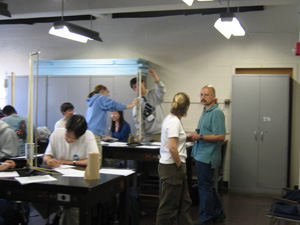
In 2002, AAPT and eight other scientific societies, including the Acoustical Society of America, the American Astronomical Society, the American Institute of Biological Sciences, the American Institute of Physics, the American Physical Society, The Optical Society, the National Association of Geoscience Teachers, the National Science Teachers Association, and the Triangle Coalition, sent the following policy statement to Congress:
"We urge Congress to support K-12 science and math education, particularly programs that enable professional development for teachers and preparation of new teachers, by funding the Math and Science Partnership programs at the levels called for in authorizing legislation."
Rep. Rush Holt (physicist and D-NJ) sent a letter "to congratulate and celebrate the achievements of the students of the United States Physics Team." Rep. Vern Ehlers (physicist and R-MI) introduced remarks into the Congressional Record on June 6 "to applaud the achievements of the members of the 2002 United States Physics Olympiad Team…I personally want to thank all of the students who made an effort to become a part of this team for showing others that science is and can be fun. Mr. Speaker, I ask my colleagues to join me in saluting these future leaders of our country." Again in 2005, Rep. Ehlers recorded a statement in the Congressional Record, congratulating the team.
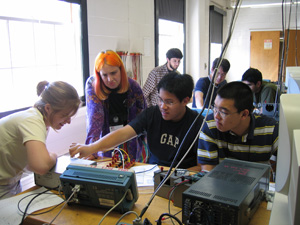
Achievements
There are many ways to measure success. One way is to look at the medals we won and how well our team performs at the International Physics Olympiad. We have been consistently successful in achieving this goal.
Awards
From 1986 to 2018, the United States Teams have brought home:
- 64 Gold Medals
- 45 Silver Medals
- 29 Bronze Medals
- 11 Honorable Mentions
Educational & Intrinsic Values
Another way is to see what immediate impact the program has had on the lives that were touched by it. In an anonymous survey answered by the team after their summer camp, students stated:
- "I enjoyed being with all these smart people who think the way I do."
- "It was great solving interesting problems with interesting people."
- "I enjoyed meeting new people with similar interests and spending time with them playing games and talking."
- "During those days in Maryland, I was given a tremendous opportunity to see into the heart of the physics community. I listened to respected researchers discuss their work. More importantly, I felt myself reaching the limits of my abilities, of my intelligence."
The training camp experience is immensely valuable for the participants. The instruction provides an introduction to university style teaching and equipment. Students become familiar with aspects of first year university curricula in physics which in turn accelerates their studies during their remaining time in high school.
Additional Information
For additional information about the U.S. Physics Team, contact the AAPT Programs and Conferences Department at (301) 209-3340 or email programs@aapt.org.
Past Physics Team Pages
Contact Information
For more details and information about the U.S. Physics Team, please contact AAPT's Programs department at 301-209-3340 or programs@aapt.org

